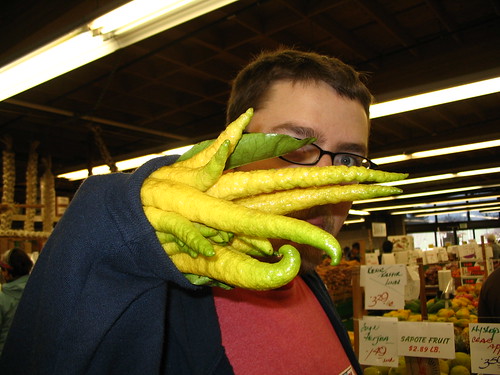Nothing Up My Sleeve
The list of my qualities that classify me as a nerd is, as I'm sure you are by now aware, as long as your arm. Or my arm. Or someone's arm, anyway. One of the entries on that list that you may not be aware of is my interest in/minor obsession with magic. There was a magic shop tucked away in a corner of the local shopping mall, and when we went to the mall, I would always go watch the proprietor demonstrating his wares. It wasn't long before I went from spectator to buyer. At first I didn't really have the patience for the stuff that required a lot of sleight-of-hand, so I mostly stuck with the more idiot-proof self-working kind of stuff. Before long, I was checking out magic books from the library and spending hours practicing all manner of sleights, forces, flourishes and so on. I didn't generally perform my tricks for anyone except my family, who generally at least feigned the proper amazement. I did put on a little show for my 7th grade class when we were doing demonstration speeches, and that went pretty well, but I didn't do children's parties or anything. I practically lived for the (at the time) annual David Copperfield TV specials. I begged and pleaded to get my Mom to take me to see him when he performed live in Boulder - and Copperfield's version of the old magician's stand-by, the saw-a-lady-in-half trick, remains one of the coolest, most amazing things I've ever seen.
Last night, we went to see The Illusionist. Emily has a not-so-secret little crush on Edward Norton, and I have my obsession with magic, so of course we had to see this one. This movie, strangely, hasn't gotten a whole lot of press, so I imagine a brief summary is in order.
Norton plays Eisenheim, the most popular illusionist in circa-1900 Vienna. His relationship with the Duchess Sophie (Jessica Biel) gets him on the bad side of the Crown Prince Leopold (Rufus Sewell, playing the Victorian equivalent of Hollywood's ever-reliable Asshole Boyfriend archetype), and therefore under the eye of Chief Inspector Uhl (Paul Giamatti). Norton and Giamatti are two of the most reliably excellent actors working today, and they are as good as we have come to expect of them. Giamatti is especially good as the conflicted police inspector, torn between his duty to the crown and his admiration for and developing friendship with Eisenheim. Sewell's role is a bit of a cliché, but he plays it to the hilt and is suitably villainous. Jessica Biel...well, she's very pretty, wears the corset-and-high-collar wardrobe very well, but isn't given a whole lot to do. Still, she acquits herself much better than many of her contemporaries would, at least holding her own against some great actors when necessary.
The movie is very pretty to look at. Prague is the city of choice these days for filming any movie set in any Victorian-era European city. Eastern Europe is, of course, cheaper than the western EU countries, to begin with. Prague is also one of the few eastern cities that wasn't bombed to the ground during the War and rebuilt in the '50s in Communist big-concrete-slab style, so the look is just right. It makes a lovely Vienna here, full of shadowy cobblestone streets, mansions and interesting old theaters. There are a few flashback sequences in the film, which are done in an interesting and beautiful way, slightly sepia-toned, and luminous and flickery like old silent films.
Above all, there is the magic. Writer/director Neil Burger really seems to understand the appeal of illusion, that it's a delicate balance between what you conceal and what you reveal. Ricky Jay, a talented magician and a well-regarded magic historian, served as a consultant on the film, and it shows. The feel of the scenes where Norton is actually performing magic is just right for the era. Magicians of the day were showmen, but their performances didn't have the more flashy theatricality and comedy of modern magicians like David Copperfield or Penn & Teller. The illusions themselves are also era-appropriate - the "Orange Tree" effect Eisenheim performs was actually performed by the popular French illusionist Robert Houdin. Of course, the technical side of stage magic actually hasn't changed much in 150 years. Copperfield and Penn & Teller achieve a lot of what they do in very similar ways to the illusionists of the Victorian era. The old trope about doing it with "smoke and mirrors" was very true at the time, and remains true to this day.
The film's ending is kind of tricky, and depending on how you read it, could be considered either a betrayal of the conceal/reveal balance, or a perfect application of it. My reading of it makes me think that Burger understands that the cinema itself is an illusion and employs many of the same techniques. Another old trope about magic and illusion is not, in fact, true. The hand is not really quicker than the eye...but by definition, the movie camera is.
It is significant that all the magic in the movie is performed for the audience, both within the movie and on the other side of the fourth wall. In the end, this movie isn't about how magic is done, but why, and that's an awful lot more interesting, I think.
***
Also, there was a trailer for the fall's other Victorian magician movie, Christopher Nolan's The Prestige, starring Christian Bale, Hugh Jackman and Scarlett Johannsen, and that one looks even better. That one has jumped up alongside Casino Royale on my Autumn must-see movie list.


